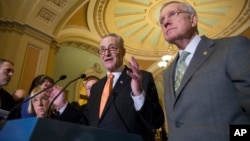House Democrats clawed their way into power and delivered a burst of historic legislation for President Barack Obama after he took office seven years ago. Now, in his final year, Obama is leaving them greatly diminished and confronting questions about whether their next generation of leaders can lead them back into the majority.
So as Obama addresses House Democrats gathered in Baltimore this week for an "issues retreat" emphasizing party unity and team spirit, it's likely to be a bittersweet experience for many.
Obama's House allies are in far worse shape politically than they ever imagined they would be at the dawn of his first term, when successive electoral romps in 2006 and 2008 gave them a whopping 257-178 seat edge in the House. Obama and then-Speaker Nancy Pelosi, D-Calif., used that majority to push through an economic stimulus package, the most far-reaching overhaul of health care since Medicare and Medicaid and a revamp of regulation of the financial services industry.
Democrats controlled majorities of the Mississippi, Arkansas and North Carolina delegations. Seats in Upstate New York that had been in GOP hands for decades were under their control. Even Alabama was evenly split.
Then came 2010, and the wave of tea party anger over Obama's policies on health care, the economy and energy wiped out many moderate and conservative Democrats representing rural swing districts. Democrats lost 63 seats, Republicans claimed the majority and Obama bemoaned the "shellacking."
"The bigger issue is really one of the image that Democrats have in rural America," said former Democratic Rep. Rick Boucher, who lost his southwestern Virginia seat that year after 14 terms in the House. "The Democrats of today tend to be the party of urban and suburban America. And the Republicans today overwhelmingly are the party of rural America. It didn't used to be that way."
Boucher said Democrats aren't offering solutions that appeal to rural voters, but the path to the majority runs through rural districts.
When Obama completes his term, Democrats will have one of their smallest minorities in the House, just 188 members to the GOP's commanding 247, and little realistic prospect of regaining control anytime soon. Not a single white Democrat in the Deep South holds a seat in Congress. Even more problematic for Democrats is that Republicans control state legislatures in Ohio, Pennsylvania, and North Carolina, and have redrawn congressional districts so as to minimize potential Democratic gains.
House Democrats, however, are natural political warriors and their spirits tend to rise in presidential election years that are far better for them than midterms.
"People are looking at the 2016 election and I think they're pretty upbeat," said Steve Elmendorf, a Democratic fundraiser and strategist. "If either Donald Trump or Ted Cruz is at the top of the ticket, everybody I talk to thinks it's going to be a good year for Democrats."
Rep. Ben Ray Lujan, D-N.M., chairman of the Democratic Congressional Campaign Committee, said Trump and Cruz have already damaged the GOP.
"The Republican presidential primary circus has already shifted the debate so far to the right to an extreme place that House Republicans, House Republican candidates and up- and down-ballot Republicans across America are taking more extreme positions and are saying more extreme things than they normally would have," Lujan said.
Pelosi and top lieutenants Steny Hoyer, D-Md., and Jim Clyburn, D-S.C., are all in their mid-70s. Some potential successors are already moving on. One of them, Rep. Chris Van Hollen, D-Md., has shifted his gaze to the Senate, resisting a plea from Pelosi to stay in the House. Another, Rep. Steve Israel, D-N.Y., named by Pelosi to a leadership post last year after four tough years as chairman of the campaign arm, has opted to retire at the end of his term.
To be sure, Pelosi and House Democrats — backed by Obama — have wielded their fair share of clout despite being relegated to the minority. GOP leaders like former Speaker John Boehner, R-Ohio, have had to look to Democrats to pass legislation, as did new Speaker Paul Ryan, R-Wis., in negotiating and passing a recent massive spending bill.
This week's issues conference will feature Obama as the keynote speaker Thursday night. Other speakers are Vice President Joe Biden, San Francisco billionaire and climate change activist Tom Steyer, "The Daily Show" host Trevor Noah, and AFL-CIO President Richard Trumka.
Pelosi and Senate Democratic leader Harry Reid of Nevada met with Obama on Tuesday and the White House issued an upbeat statement on potential areas of bipartisanship like the budget, criminal justice reform, dealing with Puerto Rico's fiscal crisis and addressing the opioid epidemic.
"There is important business to get done this year," said Deputy Press Secretary Jen Friedman.
Attendance could be lighter than normal however, since House votes have been canceled because of a crippling snowstorm.
"The weather will not get in the way of our caucus coming together," vowed Democratic Caucus Chairman Xavier Becerra of California.




